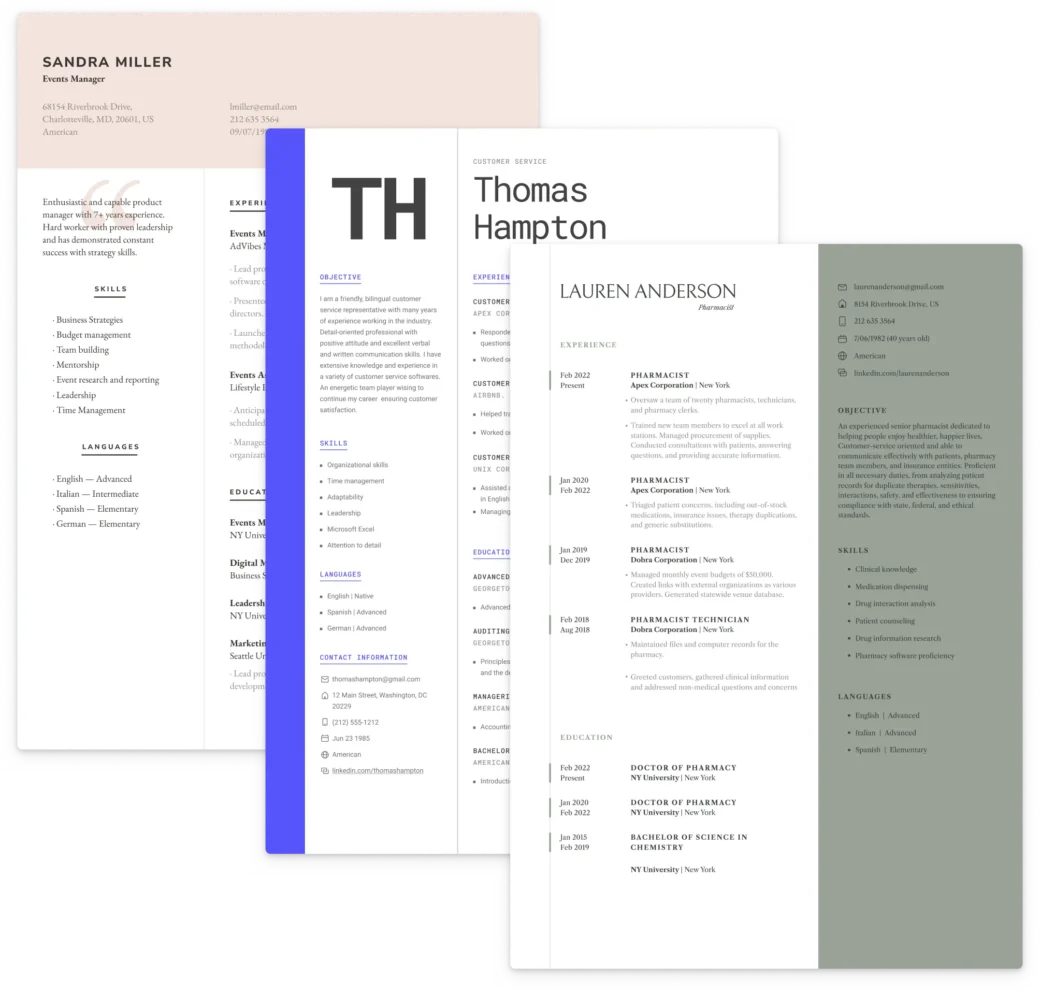- Why Add Extracurricular Activities to Your Resume
- Top 12 Extracurricular Activities for Your Resume
- How and Where To Put Extracurricular Activities on Your Resume
- Personal Interests Examples for Your Resume
- Do Not Make a Hobby of Adding Hobbies
- Key Points To Remember
- Extracurricular Activities on Your Resume FAQs:
Including extracurricular activities on your resume helps you to demonstrate skills like leadership, teamwork, communication, and collaboration.
Whether you were president of a student club or a volunteer at a local food bank, these experiences reflect valuable job-related skills relevant to the position you are pursuing.
Try ResumeGiants’ free resume builder, along with the tips below, to make putting your personal interests on your resume simple.
Why Add Extracurricular Activities to Your Resume
- Why Add Extracurricular Activities to Your Resume
Adding a succinct list of interests and hobbies to a resume is beneficial for both students and those with work experience. These activities demonstrate skills beyond those gained in the workplace, presenting you as a well-rounded candidate that companies desire.
In 2021, CoursesOnline General Manager Sarah-Jane McQueen told Quacquarelli Symonds (QS), a global leader in higher education networking, “Certain skills and ways of operating can be learned but various traits can only be forged through life experiences, so don’t be afraid of fully embracing who you are. Remember, employers want to hire real people, not interchangeable drones.”
A good list of extracurricular activities helps recruiters find a potential employee who brings:
- an enthusiasm to learn new things
- a healthy interest in diverse subjects
- and the ability to multitask
Having personal interests on your resume is beneficial for job interviews as well. Your experience in extracurriculars provides you with a well of details you can draw on to answer interview questions such as “Describe a time when you worked successfully in a team”, or “What is your greatest accomplishment?”
Just look at the experiences of other students who have made it places, like this Washington Post columnist who puts value on out-of-class experiences at college or even learning management skills through being part of a fraternity or sorority.
💡top tip
According to a 2018 study published by the Asia Pacific Journal of Human Resources, participating in one or more extracurricular activities can increase employability.
Top 12 Extracurricular Activities for Your Resume
Extracurricular activities are an excellent way to develop key skills such as leadership, teamwork, and communication.
Below are twelve activities that are particularly beneficial for candidates looking to strengthen their job applications:
- Student Council: Develops leadership and organizational skills by managing projects and collaborating with peers.
- Clubs and organizations: Encourages teamwork and communication while allowing you to pursue personal interests and share knowledge.
- Volunteering: Demonstrates commitment, compassion, and the ability to work collaboratively in diverse environments.
- Sports: Highlights teamwork, dedication, and the ability to perform under pressure, all valued by employers.
- Languages: Shows communication abilities and cultural awareness, enhancing your appeal in global job markets.
- Study abroad programs: Reflects adaptability, problem-solving skills, and an openness to new experiences.
- Tutoring: Indicates strong communication skills and a willingness to share knowledge, beneficial in educational roles.
- Multicultural organizations: Demonstrates an understanding of diversity and inclusion, important in today’s globalized workplaces.
- Artistic pursuits (Theater, Music): Develop creativity, discipline, and public speaking skills, valuable in many professional settings.
- Government or leadership roles: Builds interpersonal and problem-solving skills while showing initiative and a commitment to community involvement.
- Public speaking and debate clubs: Enhances critical thinking, persuasive speaking, and efficient researching skills, which are crucial for effective communication.
- Tutoring: Strengthens communication skills and demonstrates a commitment to helping others learn, which is valuable in educational or mentorship roles.
How and Where To Put Extracurricular Activities on Your Resume
Now that you know what to include when it comes to a resume with extracurricular activities, exactly how do you list them?
Check out where and how to place your interests and hobbies for your resume to stand out below, and use our resume checker to get a grade that tells you if your resume is ready to send.
Extracurriculars in your resume summary
Every resume should begin with a tailored summary that outlines why your experience and skillset are perfect for the job you are applying for. This is the perfect place for you to list an extracurricular activity relevant to the job you are applying for.
This is especially true for entry-level candidates.
To illustrate this, here’s an example of a resume summary that includes a valuable extracurricular activity for a recent graduate looking for a role in marketing.
Recent marketing graduate with a strong foundation in digital marketing strategies and social media management. Served as President of the University Marketing Club, where I led a team to organize successful campus-wide events and increased membership by 30%. Eager to apply my leadership skills and innovative marketing techniques in an entry-level marketing role.
This summary is effective because it highlights relevant skills and leadership experience gained through an extracurricular activity. It demonstrates initiative and the ability to achieve tangible results, which are attractive qualities for potential employers.
Use ResumeGiants’ free resume summary generator to get suggestions that highlight your relevant hobbies quickly.
An Extracurricular Activities resume section
By and large, you can add your extracurriculars under a heading titled Extracurricular Activities following your Work History section.
Here is one that lacks some of the details that are needed.
Wrong
- Member, National Honor Society
- Vice-President, Student Council
- Third baseman, Thomas Edison High School Varsity team
The best format when listing your extracurricular activities on your resume is to:
- Firstly, name the organization
- Secondly, list your position
- Then, add the dates you served in this organization
- Lastly, add the location of the organization
Let’s see it done right.
Right
- Student Council, Vice-President, University of Wisconsin, 2022 – 2023
- Led the organization of a campus-wide sustainability initiative, coordinating efforts across 10 student organizations to promote environmental awareness.
- National Honor Society, President, Walter Grove High School, 2020 – 2021
- Member, Walter Grove High School Varsity Baseball team, third baseman, co-captain 2019 – 2020
You could also use a bullet list for each entry that details your responsibilities and gives examples of which skills you developed and how you used them.
The following are extracurricular activities examples for a resume that provide details about each activity:
President/Member
Student Council, University of Wisconsin, 10/2022 – 12/2023
- Served as President, 01/2023 – 06/2023
- Ran weekly general assembly meetings
- Created and implemented council budget
- Coordinated fundraising events, exceeded fundraising goals by 30%
President/Member
National Honor Society, Walter Grove High School, October 2018 – May 2021
- Elected President February 2020
- Oversaw team to promote activities and schedule events
- Conducted monthly meetings
- Maintained 4.0 GPA for all three years to remain eligible for membership
Varsity Baseball Player
Walter Grove High School, 2019 – 2021
- Voted Most Improved Player, 2019
- Played primarily third base, relief pitcher
- Elected co-captain, 2020
- Assisted in leading team to state semifinals, 2012
💡top tip
Check out which skills an employer looks for in the particular position you are pursuing by researching the company, then, when possible, highlight those extracurricular activities.
Personal Interests Examples for Your Resume
Basically, almost any activity outside of work that has helped to build skills in various areas, such as leadership or communication, you can and should add to a resume.
Here are some Resume examples of extracurricular activities samples for a resume that you can include:
- Student council/clubs
- Sports involvement
- Student newspapers
- Volunteering
- Civic activities
- Philanthropic activities
- Club memberships
- Foreign language studies
- Fundraising activities
- Freelance projects
- Work study program
- Study abroad program
- Student government involvement
You don’t necessarily need to have assumed a leadership role in any of these activities. Simply fitting these activities into your schedule displays organizational, time management, collaboration, teamwork, and interpersonal skills.
What hard and soft skills can you demonstrate through extracurricular activities?
Employers might see involvement in extracurricular activities as having been a way to develop soft skills needed for the position they are offering. Some particular extracurriculars that employers might look for and the skills these activities build include:
- Student associations: organizational and teamwork skills
- Study abroad: communication skills; learning a foreign language
- Volunteering: collaboration and leadership skills
- Freelance project development: decision-making and creative skills
What activities do not count as extracurricular?
Any task directly related to your college studies, such as writing a research paper or heading a specific student project, would not be extracurricular. If your research paper was published or you led a team to complete an assigned project, you might list those in the Education section following your degree earned and school attended.
💡top tip
There is no need to add details such as leading a school project assignment if you have an extensive work history that demonstrates leadership.
Do Not Make a Hobby of Adding Hobbies
Hobbies and extracurricular activities serve different purposes on a resume. While extracurriculars highlight skills beyond work or academics, hobbies do not always translate into relevant qualifications. For example, fishing as a solitary activity may not demonstrate communication or leadership skills.
That said, hobbies can sometimes align with valuable skill sets. If a hobby evolves into something more structured—like turning a passion for fitness into a role as a fitness instructor—it can showcase skills worth including on your resume.
In such cases, these skills should be listed under the Skills section and tied to other relevant experiences or achievements elsewhere in your resume to reinforce their impact.
💡top tip
Lacking extracurricular activities does not doom your resume. You can enhance it by including professional certifications, memberships, publications, awards, and projects in other sections to help you stand out.
Key Points To Remember
As you enter the professional world, including extracurricular activities in your resume can highlight skills you have yet to demonstrate in a job setting.
- Choose activities that shine a light on your teamwork, communication, leadership, problem-solving, and responsibility.
- Skip academic work or hobbies here. Save those for the education or hobbies sections.
- Remember, the placement of these activities can vary with different resume formats.
If you are unsure about how to write your resume, check out one of our many examples, including our student resume templates. If you follow our tips and use our samples for inspiration, you should be lining up the job interviews in no time!

Build your perfect resume with ease
Craft the perfect resume effortlessly with our builder. Get started today!
Extracurricular Activities on Your Resume FAQs:
Unless they are directly relevant to the role or industry you’re targeting, and you lack more recent, applicable experience, extracurricular activities typically should not appear on your resume once you’re more than 5 years past graduation.
There are some key differences between hobbies and personal interests.
A hobby is an activity you engage in for enjoyment, such as playing a sport, practicing yoga, meditating, fishing, or surfing.
Conversely, personal interest is something you are aware of or curious about, and often involves research and gathering knowledge.
Hobbies and personal interests you add to your resume will be regarded as a reflection of who you are and what you have to offer, and won’t be viewed separately.
However, for professions that are qualification-heavy, such as healthcare, it’s often advisable to prioritize qualifications, publications, conferences, and professional memberships over hobbies and interests.
Using our resume builder can help ensure you leave out irrelevant information and add only details that will interest the hiring manager.
While it’s true that personal interests can offer a glimpse into your personality and potentially connect with a recruiter, some hobbies might raise eyebrows or inadvertently lead to bias.
It’s essential to tread carefully and consider the potential implications of each hobby you list.
To guide you, here’s a list of hobbies that you might consider avoiding on your resume, unless it is relevant to the job description:
- Watching TV or movies
- Political activism
- Hunting
- Religious activities
- Extreme sports
- Gambling
- Collecting weapons
Related Posts

